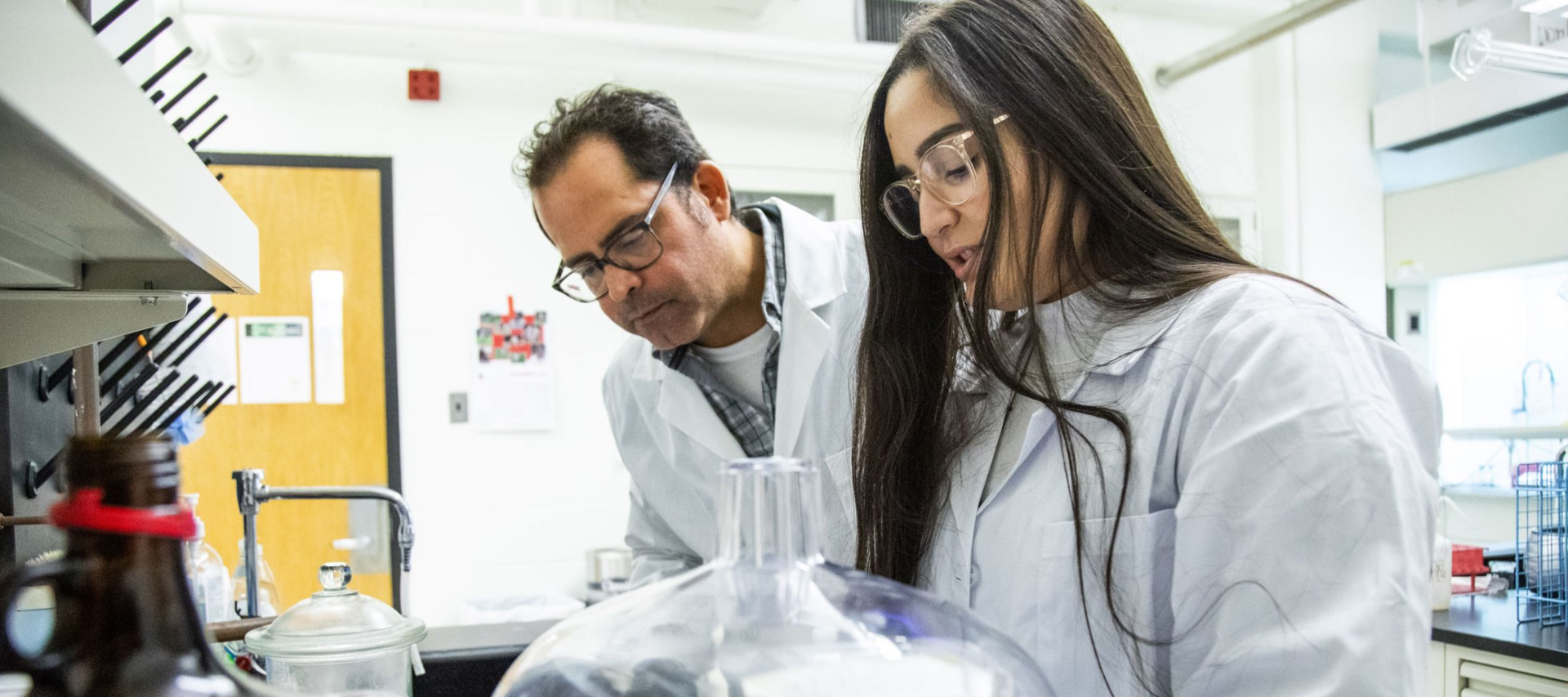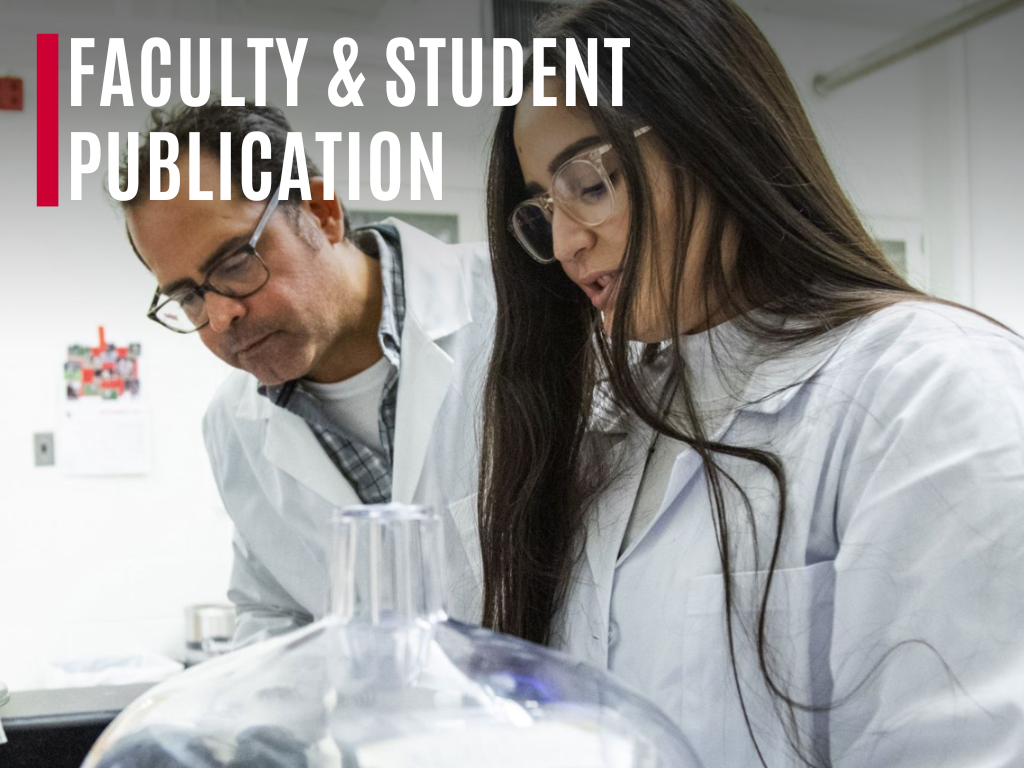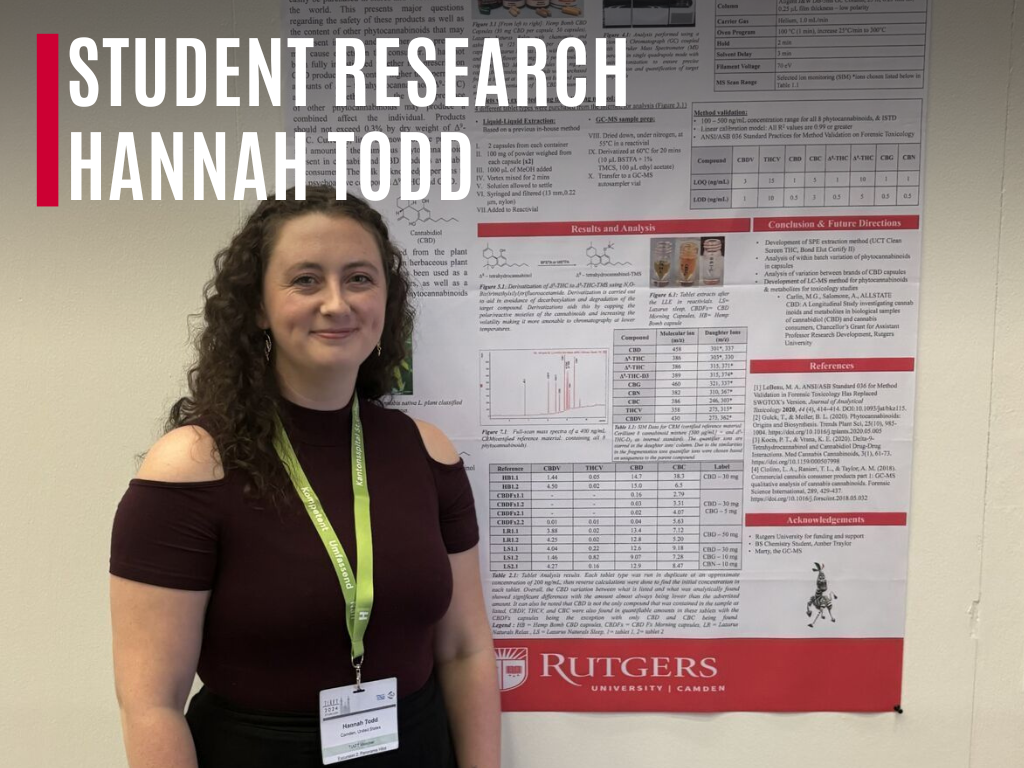
Chemistry & Molecular Technology (M.S.)
Welcome to the Chemistry & Molecular Technology Graduate program at Rutgers-Camden. In our program, we prioritize the importance of hands-on laboratory experience to ensure optimal learning and reinforce fundamental concepts. As a student, you will have the valuable opportunity to actively engage in modern chemical research, utilizing state-of-the-art instrumentation and technology. Through this experiential approach, we aim to cultivate your skills in effective communication, critical thinking, and problem-solving, which are fundamental for success in the field of chemistry.
TAKE THE NEXT STEP
We are excited to have you join our Chemistry & Molecular Technology Program at Rutgers-Camden. Whether you are looking to advance your career, pursue further studies, or enter the chemical and pharmaceutical industries, our program will provide you with the necessary skills and preparation for success.
In our program, you can choose between two tracks:
Experimental Track
The Experimental Track is ideal for students interested in advancing their careers in the sciences, particularly in professions requiring skills in polymer materials, organic synthesis, biomaterials and eco-design, bio-mimic assembly, bioanalytical forensic chemistry, molecular modeling and machine learning, forensic chemistry, toxicology, biosensing and nanotechnology, organometallic, biophysics, materials physics, within others. Students in this track have the opportunity to work closely with faculty on research projects and complete a thesis.
Professional
The Professional Track is designed for mid-career science professionals and students seeking a flexible, part-time M.S. schedule. It is well suited for those working in pharmaceuticals, biotechnology, environmental science, forensic chemistry, materials science, and related fields. This track provides advanced coursework in analytical, organic, inorganic, and physical chemistry without the thesis requirement. It is also beneficial for students looking to strengthen their academic records for applications to professional graduate programs.
By the end of the program, you will have acquired the knowledge and understanding to apply the fundamentals of chemistry appropriately. You will have gained experience in standard laboratory activities, experimental design and execution, synthesis and characterization, accurate measurements, modern instrumentation, and chemical safety. Additionally, you will have developed the ability to locate scientific information within the chemical literature and effectively express chemical knowledge through written and oral forms.
Graduates of our program find successful careers in various industries, such as the chemical and pharmaceutical sectors, and teaching positions, or they continue their education in Ph.D. programs in chemistry, biochemistry, pharmacology, food science, materials science, or related fields.
Program Overview
DETAIL | DESCRIPTION |
|---|---|
| DEGREE | Master of Science (M.S.) Accelerated option available |
| CREDITS | 30 credits |
| FORMAT | Full-time or part-time, on-campus |
| DURATION | 4-5 semesters |
| FUNDING | University and Graduate School Funding Available (Partial Funding Only) |
Chemistry & Molecular Technology Program in Action
Get to know this program through archived stories—then discover what sets Rutgers Graduate School-Camden apart. From the Recording Rutgers podcast to faculty spotlights, campus life, alumni journeys, and student experiences, you’ll find a “Community in Action”, grounded in connection, purpose, and possibility.
-
Innovation Recognized: Honoring Breakthrough Patent Achievements
Beneath the Rutgers President’s Tent in New Brunswick, the inaugural Rutgers Innovation Awards banquet brought together the university’s brightest minds to celebrate groundbreaking achievements in research and innovation. The event recognized individuals who had secured U.S. patents during fiscal years 2023 and 2024, as well as researchers whose work exemplifies the potential to transform lives… continue reading
-

NIH Grant Fuels Cutting-Edge Genome Editing
Genetic disorders like sickle cell anemia affect millions worldwide, and… continue reading
-

CNC Nanomaterials Study Published
Abneris Morales, a PhD candidate in Computational and Integrative Biology… continue reading
-

Unlocking the Secrets of a 16th-Century Masterpiece
Beneath the visible brushstrokes of a 16th-century painting lies a… continue reading
-

Chemistry Research Takes the Scenic Route to Switzerland
The scenic city of St. Gallen, Switzerland, provided a fitting… continue reading
Featured Courses
View the list of Course Descriptions.
ADVANCED ORGANIC CHEMISTRY I (56:160:511)
Advanced organic chemistry survey covers molecular orbital theory, stereochemistry, reactive intermediates (like free radicals), photochemistry, and structure-reactivity relationships.
NMR SPECTROSCOPY
(56:160:534)
Introduction to NMR principles, focusing on liquid-state NMR. Topics include chemical shifts, couplings, relaxation effects, 2D NMR, solid-state NMR, and emerging technologies.
RADIOCHEMISTRY AND RADIATION CHEMISTRY
(56:160:545)
This course delves into ionizing radiation’s interactions with matter and resulting chemical reactions, covering excitation, ionization, free radicals, and nuclear reactions.
FUND. OF PHARMACOLOGY & PHARMACOKINETICS (56:160:611)
This course offers a theoretical foundation in pharmacology, encompassing pharmacokinetics and pharmacodynamics, emphasizing drug absorption, distribution, metabolism, excretion, and effects.
PROTEIN STRUCTURE AND FUNCTION
(56:115:522 )
This course covers polypeptide structure, enzyme catalysis, biophysical techniques for protein structure determination, folding, interactions, and engineering for a comprehensive protein study
BIOCHEMISTRY I, II
(56:115:511,512)
Explore protein, enzyme, carbohydrate, lipid, and nucleic acid chemistry. Survey metabolic pathways with regulation emphasis for comprehensive molecular biological system understanding.
Admissions Requirements
DETAIL | DESCRIPTION |
|---|---|
| TRANSCRIPTS | A transcript showing the completion of an undergraduate degree in chemistry, biochemistry, or a related science |
| LETTERS OF RECOMMENDATION | Two letters of recommendation |
| PERSONAL STATEMENT | A statement of personal, professional, and academic goals |
| STANDARDIZED TEST | GRE Scores are no longer required. |
| RESUME/CURRICULUM VITAE | CV or Resume |
Application Deadlines
Preference is given to those submitted before the deadline for both decisions and funding opportunities. Applications received after the deadlines will be considered based on available space and budgetary constraints.
Fall
MAR 15
Spring
OCT 15
Summer
NOT OFFERED
Reach Out to Us
Let’s begin a conversation about your academic and professional goals. If you have questions regarding the curriculum, faculty, admission criteria, or committee, please feel free to contact the Graduate Program Director. For administrative inquiries concerning the application process, campus, tuition, and fees, reach out to the Graduate School. We are dedicated to assisting you from application to graduation day.
DEPARTMENT CONTACT
Dr. David Salas de la Cruz
Graduate Director
ds1191@camden.rutgers.edu
(856) 225-6147
GRADUATE SCHOOL CONTACT
Erick E. Watt-Udogu
Assistant Dean, Graduate School-Camden
erick.watt.udogu@camden.rutgers.edu
(856) 225-6149
Take the Next Step.
We invite you to explore the boundless opportunities that await you here, where a world-class faculty, diverse community, and innovative curriculum converge to nurture your intellect and foster your professional growth. Your future starts with a simple yet significant act – learning more about the exceptional programs we offer. So, why wait? Start your application journey with us, and together, we’ll unlock a future filled with possibilities and endless success.
